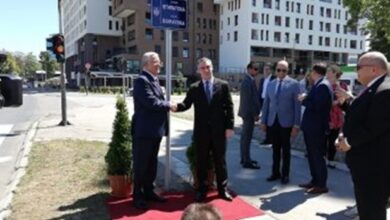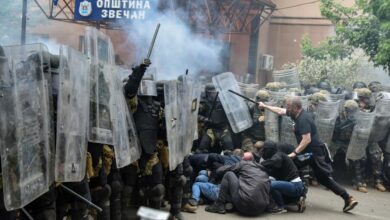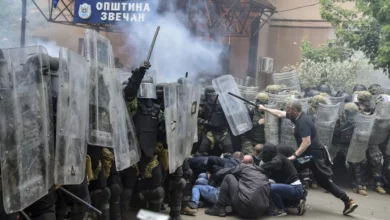Belgrade–The Serbian parliament early Wednesday passed a landmark resolution condemning the 1995 Srebrenica massacre of some 8,000 Bosnian Muslims but stopped short of labeling the killings a genocide.
The adoption of the text with a majority of 127 of the 173 lawmakers present ends years of denial by Serbian politicians about the scale of the killings.
"The parliament of Serbia strongly condemns the crime committed against the Bosnian Muslim population of Srebrenica in July 1995, as determined by the International Court of Justice (ICJ) ruling," the text says.
The lawmakers also formally extended "their condolences and an apology to the families of the victims because not everything possible was done to prevent the tragedy."
The ruling coalition which proposed the resolution hailed its adoption after 13 hours of often heated debate but warned this was only the beginning of the process for Serbia of coming to terms with its recent history.
"This declaration is only a beginning because the issues it treats are only the tip of the iceberg of the past we have to face," ruling coalition member Nenad Canak said after the vote.
"(The resolution) was the most difficult step but I am convinced that we will now open the process of reviewing recent history; this will be long and painful."
In the text the parliament also vowed to continue its cooperation with the International Criminal Court for the former Yugoslavia (ICTY) and stressed the importance of "the discovery and arrest of Ratko Mladic so that he might stand trial before the ICTY".
Mladic, the UN war crimes court’s most wanted fugitive, was in charge of the Bosnian Serb troops who overran the UN protected enclave in July 1995. He is believed to be hiding in Serbia.
The timing of the historical declaration coincides with Serbia’s push to join the European Union with Belgrade hoping to achieve candidate status next year. The EU has made full cooperation with the ICTY a prerequisite for being allowed to join the bloc and has hammered on the importance of reconciliation in the region.
Although Serbian President Boris Tadic attended the 10-year-anniversary of the massacre in 2005 and apologized to survivors there, he was widely condemned for doing so at home.
The pro-European Tadic has pushed for the Srebrenica resolution and was expected to react to the vote later Wednesday.
Belgrade is also keen to show it respects rulings of the ICJ ahead of an expected advisory opinion of the highest UN court on the legal status of Kosovo, which declared independence from Serbia in 2008.
Although the Srebrenica massacre has been ruled a genocide by both the ICTY and the ICJ, the resolution avoids using the term in order to ensure the widest possible backing in parliament.
Still, many hours of debate on Tuesday were devoted to the definition of genocide and opposition parties complained the text branded all Serbs as guilty over Srebrenica.
The massacre is the only episode in Bosnia’s bloody 1992-95 war to have been ruled as genocide by the international courts.
In their ruling, ICJ judges cleared Serbia of responsibility for the actual killings themselves but said Belgrade was responsible for doing nothing to prevent the massacre.
After separating the men from the women, Bosnian Serb troops led by Mladic summarily executed some 8,000 Muslim men and boys and buried the bodies in various mass graves.
Fifteen years after the killings, the remains of thousands of massacre victims have been exhumed from more than 70 mass graves around the town of Srebrenica, with more than 5,600 victims identified by DNA analysis.
But for many years Serbia downplayed the scale of the killings and many here still consider Mladic a war hero who fought for Serb interests.



